Bass CDs
New Album: Bassist Trevor Dunn, Séances
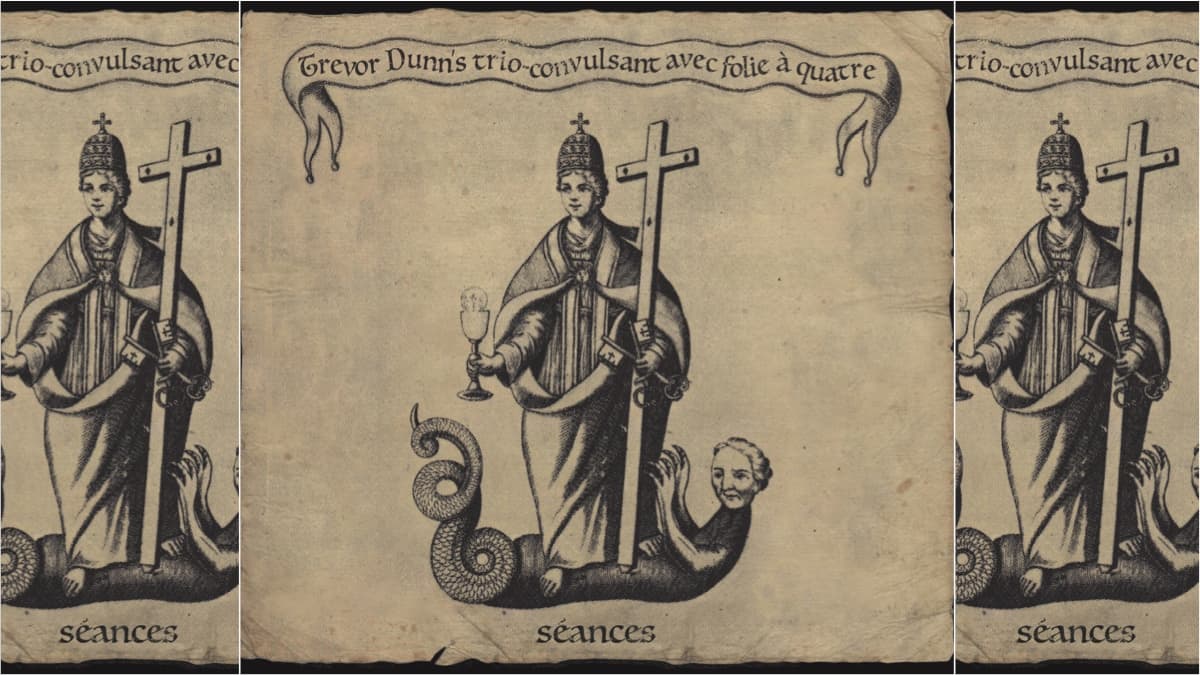
Trevor Dunn, Séances…
Bassist/Composer Trevor Dunn reconvenes and expands his genre-blurring Trio-Convulsant for the first time in 18 years with a startlingly inventive new album.
When we last heard from Trevor Dunn’s Trio-Convulsant it was 2004; the bassist/composer was not far removed from the break-up of avant-rock provocateurs Mr. Bungle and still freshly relocated to New York and a plunge into the more exploratory end of the city’s jazz scene. Following up the Surrealism-inspired trio’s obscure 1998 debut Debutantes & Centipedes with Sister Phantom Owl Fish, Dunn had reconfigured Trio-Convulsant with a pair of promising but then relatively unknown new voices: guitarist Mary Halvorson and drummer/percussionist Ches Smith.
In the 18 years since, Halvorson and Smith have established themselves as two of the most innovative and acclaimed figures in modern jazz and creative music, while Dunn has embarked on a stunning array of venturesome projects, including a recent reunion of Mr. Bungle, membership in bands including Endangered Blood, SpermChurch, Dan Weiss’ Starebaby, and the Nels Cline Singers, stints in weirdo-rock outfits Fantômas (with Bungle co-founder Mike Patton, the Melvins’ Buzz Osborne, and Slayer’s Dave Lombardo), Tomahawk and the Melvins; and collaborations with the likes of John Zorn, Wendy Eisenberg, Kris Davis, Jamie Saft, Shelley Burgon, Roswell Rudd and Erik Friedlander, among others.
With Trio-Convulsant’s long-awaited follow-up, Séances, Dunn draws together those various threads into his most ambitious and deliriously inventive work to date. Released in October via Pyroclastic Records, Séances reconvenes the trio with Halvorson and Smith while expanding its possibilities with the addition of Folie à Quatre, a string and winds quartet comprising four remarkable players and composers in their own rights: violinist/violist Carla Kihlstedt (Tin Hat), bass clarinetist Oscar Noriega (Tim Berne’s Snakeoil), cellist Mariel Roberts (Wet Ink Ensemble) and flutist Anna Webber (Webber/Morris Big Band).
The line-up and music for Séances came together following a frustrating attempt in 2015 to compose new music for Trio-Convulsant and string quartet. “Once I realized the string quartet music didn’t work,” Dunn recalls, “I decided to change the orchestration to expand the palette even more, trio being such an intimate ensemble. I put out an album of my chamber music on Tzadik [2019’s Nocturnes], so I’d gotten the string quartet thing out of my system. The ensemble started to come together in my head, but it ultimately it took me years to figure out what I was trying to do musically. Then at some point during quarantine, it finally reared its head.”
The final form of the music was partially guided by two vastly different and typically (for Dunn) eclectic inspirations: Desmond Blue, a 1962 album by saxophonist Paul Desmond’s band with guitarist Jim Hall paired with a string orchestra; and the Convulsionnaires of Saint-Médard, an 18th-century French Christian sect whose fevered worship took on the former of ecstatic convulsions and miraculous, near-orgiastic displays. The divinely musical and the esoterically divine converged in Dunn’s mind as he composed the challenging, transcendent music of Séances.
“The name of the band comes from a Surrealist concept,” Dunn explains, “so when I read about the Convulsionnaires it felt like returning back the origins of that. Whether you believe these miracles happened or not, the idea of mass hysteria and group belief is fascinating to me. So this one weird, obscure concept became a kind of unifying principle for the album. I don’t know how much my research informed the actual music beyond the subliminal, but interesting accidents happen sometimes, and I like to grab onto those accidents.”
Where Trio-Convulsant was originally conceived, as Dunn describes, to “make jazz heavier and make heavy music more harmonically rich,” Séances further evolves that vision to embrace the myriad styles and forms that Dunn has explored over the years, melding bludgeoning metal with intricate contemporary chamber music, boundary-blurring jazz with mutated country blues. Dunn’s liner notes spotlight the arcane wanderings of his imagination, enfolding concepts from microtonal flute and bebop to numerology and “spontaneous milk-vomiting and levitation.” The writing is nearly as densely-packed, mysterious and compulsively fascinating as the music itself.
Trevor Dunn’s Trio-Convulsant avec Folie à Quatre – Séances
Pyroclastic Records – PR 21 – Recorded January 2022
Visit online at trevordunn.net
Bass CDs
Reissue: Geddy Lee’s My Favourite Headache and Alex Lifeson’s Victor
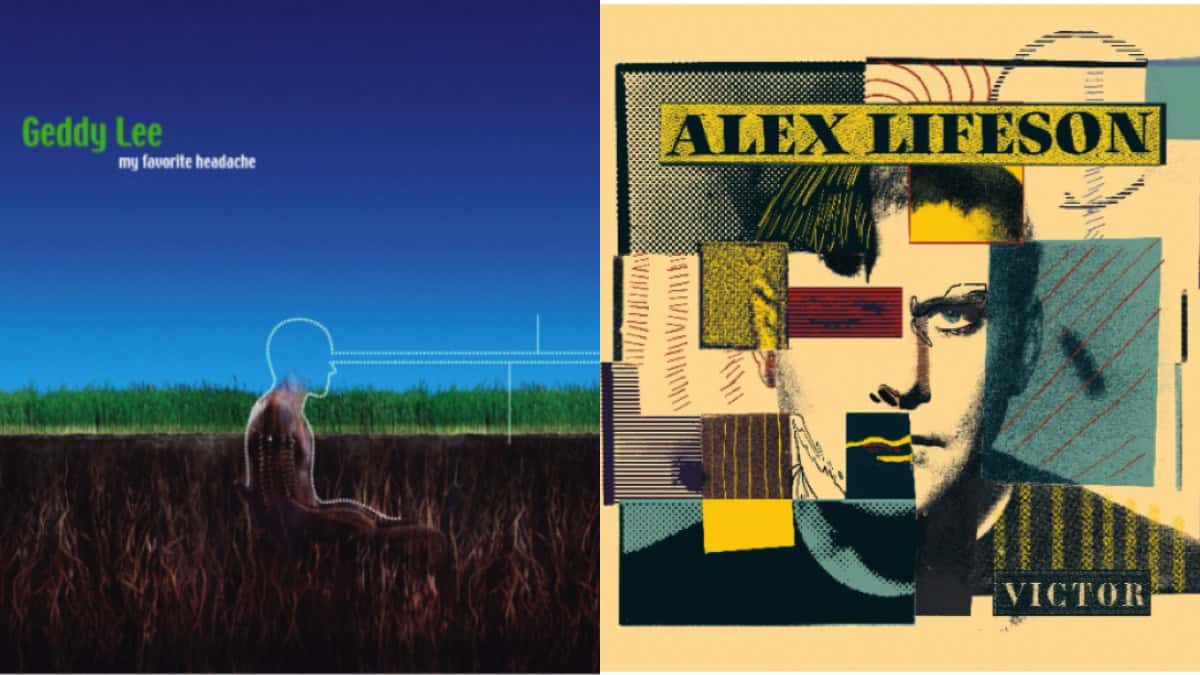
In an exciting announcement for Rush fans and rock enthusiasts alike, Anthem Records in Canada and Rhino Records will reissue the first-ever solo albums of Alex Lifeson and Geddy Lee. Lifeson’s 1996 album Victor and Lee’s 2000 offering My Favourite Headache will be re-released on August 9, 2024, in various formats, including a range of vinyl configurations.
My Favourite Headache, Geddy Lee’s only solo album to date, was initially released on November 14, 2000. This reissue marks its first vinyl pressing since a limited-edition Record Store Day exclusive in 2019. The fourth side of the album features two instrumental mixes. Produced by Lee, Ben Mink, and David Leonard, the album includes contributions from Mink and drummers Matt Cameron (Soundgarden/Pearl Jam) and Jeremy Taggart (Our Lady Peace).
Victor, originally released on January 9, 1996, marks Alex Lifeson’s solo debut. Lifeson took on the roles of songwriter, producer, and mixer for this album. For the first time, Victor will be available on vinyl, featuring a complete remix by Lifeson himself to enhance the audio quality. The fourth side of the album includes four instrumental tracks previously exclusive to Lifeson’s website. Guest artists include lead vocalist Edwin from I Mother Earth, Primus bassist Les Claypool, and Canadian powerhouse vocalist Lisa Dalbello. The 15-song collection is paired with striking 2024 reimagined artwork by Fantoons Animation Studios.
For more details on the Geddy Lee reissue and to preorder, https://lnk.to/MyFavouriteHeadache
For more details on the Alex Lifeson reissue and to preorder, https://lnk.to/AlexLifesonVictor
Bass CDs
New Album: Ben Wolfe, The Understated
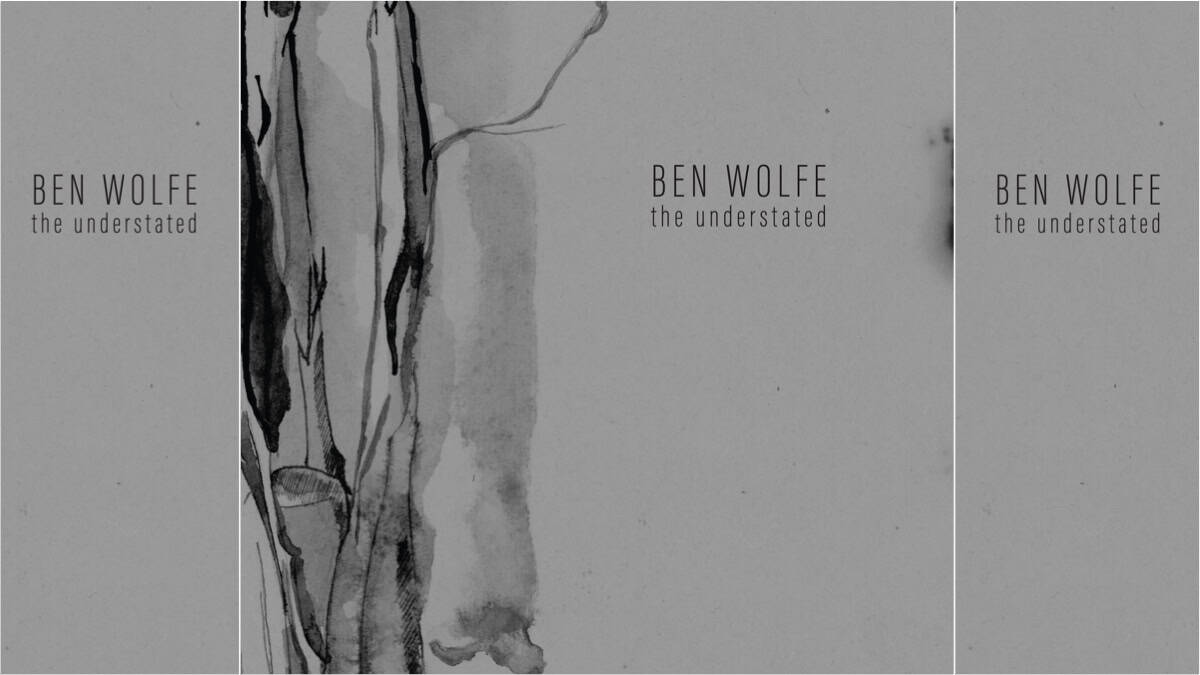
Acclaimed bassist and composer Ben Wolfe is thrilled to announce the August 9, 2024 release of The Understated.
This evocative new album features a collection of new original compositions by Wolfe paired, with re-imaginings of some of the composer’s classic material, with a particular emphasis on the ballad song-form. The album features ten tracks, five of which are ballads – a bold move for any composer – Wolfe creates a cohesive narrative here that challenges the listeners perception of the classic ballad. The Understated features Wolfe alongside artists who make up the very frontline of modern jazz, including pianist Orrin Evans, tenor saxophonist Nicole Glover, drummer Aaron Kimmel, guitarist Russell Malone and pianist Sullivan Fortner.
Wolfe has always been drawn to finding beauty in subtlety. He perceives a certain tranquility and elegance in the Coltrane Quartet, Louis Armstrong’s Hot Fives and Sevens, the legendary Miles Davis bands and rhythm sections, and the music of Charlie Parker. While he, of course, revels at the immense world-building energy of this music, it’s the “other side” – the elusive, magical aspect that endlessly captivates him – the understated. The composer draws inspiration most from the ensemble work of these hallmark jazz ensembles. Despite the individual parts being extraordinarily beautiful on their own, the musicians in these archetypal ensembles play only what is needed to serve the music, paying particular attention to the band-sound more-so than their individual sound. The Understated embodies this ethos with a tremendously impactful ensemble-oriented approach.
Wolfe sought to continue the thread started by “Lullaby in D” from his previous critically acclaimed release Unjust. Wolfe indicates, “Something about that take was so perfect to me. It had been brought to life, and it had that ensemble thing.” Wolfe assembled the quartet who recorded “Lullaby” (including longtime collaborator Orrin Evans, as well as recent frequent collaborators Aaron Kimmel and Nicole Glover) and two very special guests, Russell Malone and Sullivan Fortner. The recording process took place in one room with no headphones or isolation booths, further emphasizing the group’s collective awareness.
This record succeeds in bringing Wolfe’s expansive music to life through extremely conscientious group playing. Nothing is forced or pushed; everything that needs to be stated is stated. The single from the album, “Waltz,” encapsulates the spirit of the project. Wolfe says, “I view albums like a complete painting, so singles have been difficult for me. This song is very much in the spirit of the whole but doesn’t give away the record.” The piece features a sentimental melody delivered with grace by tenor saxophonist Nicole Glover, before Glover and Evans embark on stirring solos dancing in and out of the tune’s harmony.
Other new original compositions featured here include “Ballad in B”, which perhaps best demonstrates the group’s stunning cohesion. This tune is a refreshing diversion as it features a serene repeated melody without overt melodic improvisation. The following track, “Anagram”, begins with Kimmel’s rhythmic refrains and a unison melody played by Glover and Wolfe and is a true ensemble piece. On this track, Wolfe shines with a lyrical solo. The moody short interlude “So Indeed” is a lyrical masterwork that leaves the listener wanting even more. “Beautiful You” features master guitarist Russell Malone on the track’s melody. The emphasis here on restrained lyricism is a prime reminder of the old adage “it’s not the notes you play, it’s the notes you don’t play”. Each pocket of space in between melodic moments leaves room for the listener to breathe deeper and deeper into the song. The driving “Triangle Man” features fantastic improvisation from Glover and Kimmel. The tender “Barely Spoken” concludes the album with a feature for pianist Sullivan Fortner.
The album also weaves in references to Wolfe’s past works, creating a personal musical universe. “The Poet Speaks” is the opening track on his first record, 13 Sketches. “Occam’s Razor” was composed years ago for a collaboration with a choreographer and painter, and was a much different composition in its original form. “Love Is Near” was originally found on The Whisperer. With ballads in particular, Ben uses voicings and sounds that represent certain things to him, intentionally referencing his other compositions to generate connections between his songs.
Wolfe’s tremendous compositions on this album are also influenced by the group of musicians that he assembled for this release. Wolfe remarks “One of the things these five musicians share in common is that not only are they true ensemble players, they will always play something unexpected and special.” Listeners will find calm and beauty within the ensemble performances throughout The Understated.
Visit online at benwolfe.com/
Bass CDs
New Album: Orlando le Fleming, Wandering Talk
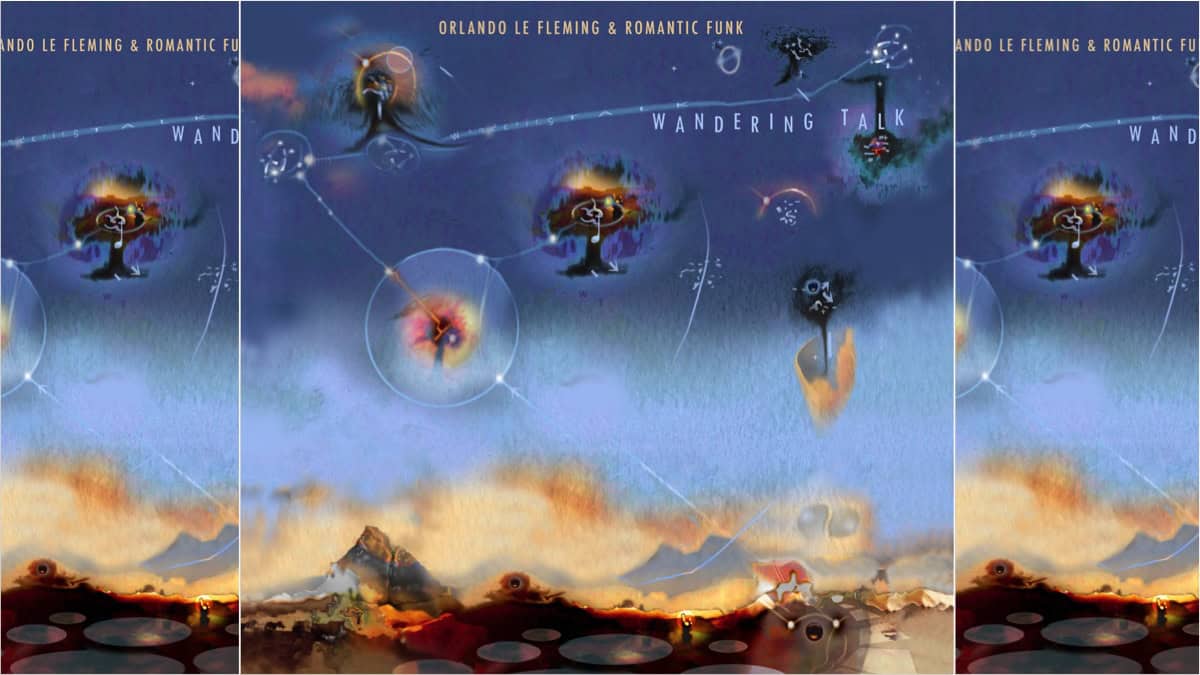
Bassist, band leader, and composer Orlando le Fleming continues to make music that crosses genres as readily as he crosses the Atlantic, with this new album ‘Wandering Talk’, to be released physically on 23rd August via the UK’s premiere jazz label, Whirlwind Recordings.
After 20 years in New York City, he’s back in his native UK, forging new pathways and renewing old partnerships. His love for the acoustic tradition continues unabated alongside his deep affection for the robust, muscular electric fusion that emerged in the 1980s, and he has received critical acclaim from media including The Guardian, Financial Times, Jazzwise, and All About Jazz among others. He has also toured and recorded with some of the world’s greatest jazz musicians including Branford Marsalis, Kurt Rosenwinkel, Antonio Sanchez, Ari Hoenig, and Wayne Krantz.
The Romantic Funk project was born in New York’s legendary 55 Bar to explore that legacy: now the new album ‘Wandering Talk’ builds on the critical acclaim generated by ‘The Unfamiliar’ (2020), building on the framework with a set of collaborators that brings together London and New York, past and present, acoustic, and electric, and merges it all into a spectacular whole.
Following the same principles that served the project in NYC, le Fleming booked four Friday nights at London’s renowned Vortex Club to workshop the music that would become the album, with a rotating cast of players which he honed down into the final line-up. Old London friends Tom Cawley (piano/keys) and James Maddren (drums) completed the rhythm section. New acquaintance Nathaniel Facey was picked from the ranks of the UK’s brightest young saxophone players. NYC stalwart Philip Dizack flew in from the US to play trumpet and reaching back to Orlando’s school days and forward to his own family, one-time classmate Chris Martin (Coldplay) and his own daughter Nadia combined to provide vocals on a special setting of Rumi’s poetry.
As before, the music combines fusion’s flash and fire with a contemporary sensibility. This time, Orlando’s questing spirit sends his superb band forward to investigate fresh areas of creativity in dynamic and texture.
Visit online at orlandolefleming.com
Bass CDs
Album: John Entwistle, Rarities Oxhumed – Volume Two
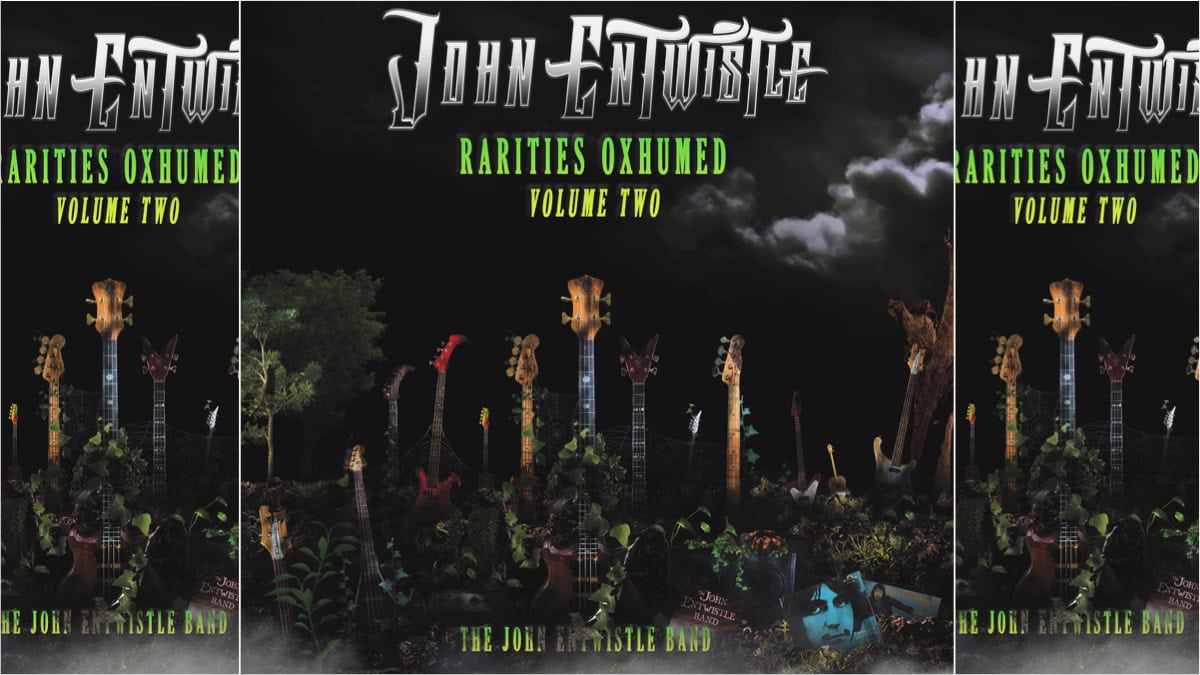
Album: John Entwistle, Rarities Oxhumed – Volume Two
Rarities Oxhumed – Volume Two is the second of the series of posthumous releases coming from John Entwistle.
Rarities Oxhumed – Volume Two is a compilation that was curated by drummer Steve Luongo, who served as John Entwistle’s producer, bandmate, business partner and good friend for many years. As Luongo states, “When I agreed to do two volumes of John Entwistle rarities, I knew volume two had to be even better than volume one. It is!” The collection of songs on Volume Two are from his years with the John Entwistle Band and include re-mastered versions of studio tracks including “Endless Vacation”, alternate mixes of tracks like “Sometimes”, and live tracks including The Who cuts “Real Me”, “Long Live Rock” and an epic version of “Young Man Blues”. The latest preview track to be released is the Who cut “Had Enough.”
Listen to “Had Enough” here: push.fm/ps/hadenough
Rarities Oxhumed – Volume One was quickly embraced by longtime fans as it featured gems like “Bogey Man” featuring Keith Moon, “Where You Going Now” (demo for the Who), and a raw live version of “Trick of the Light” recorded during the John Entwistle Band’s final tour in 2001. Deko Entertainment is thrilled to have been able to bring both volumes of this unearthed music of John Entwistle to the fans and forever solidify him as one of the greatest rock musicians ever.
For more information, visit online at dekoentertainment.com/john-entwistle
Bass CDs
Album Review: Mark Egan, Cross Currents
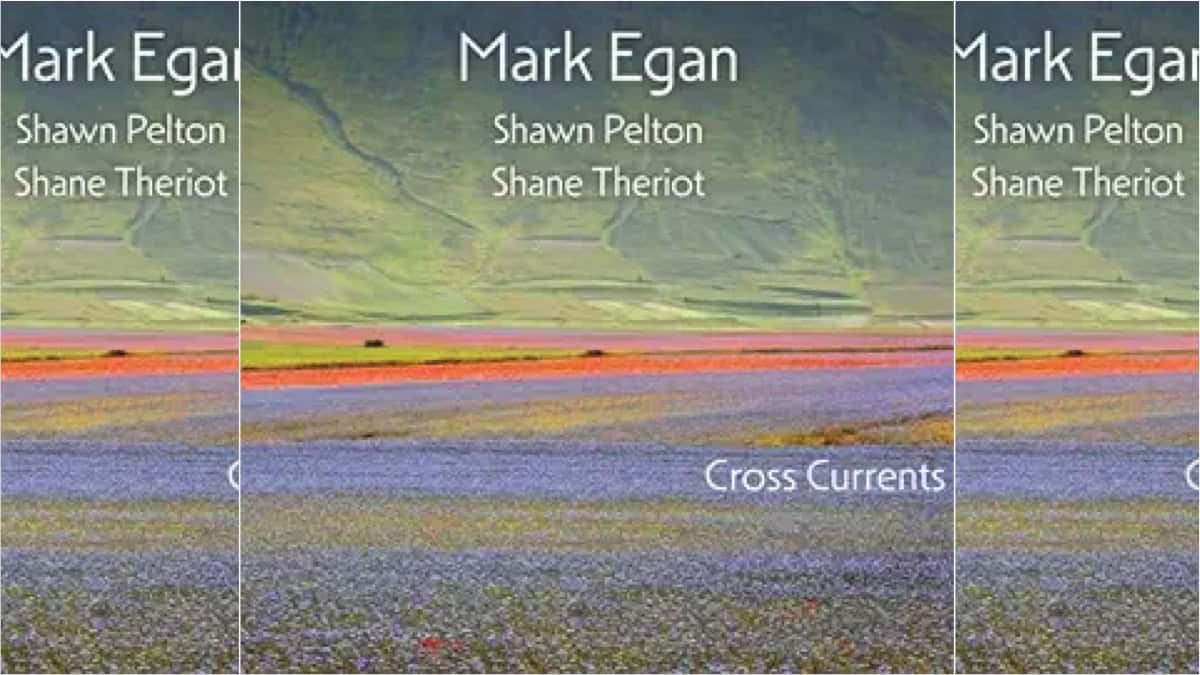
Mark Egan, Cross Currents…
It is exciting every time I get a new album from Mark Egan as he is such an amazingly versatile player and I never know what to expect (except for excellent artistry!) In his latest release, Mark has teamed up with Shawn Peyton on drums and Shane Theriot on guitar to bring us “Cross Currents”.
This collection of eleven tracks transports me to the Gulf Coast (New Orleans specifically). Mark’s fretless basses lay down a solid groove and lots of juicy solo work for this rootsy collection of funk, ambient, swamp-rock, second line, ballads, Cajun and even Indian Raga.
This trio is super-tight and the musicianship is flawless as each member has ample opportunity to shine. Even though each player is very talented in their own right, I feel that the collective energy is greater than just the sum of the players on this album. Each musician contributed to composing music for this project but the lion’s share are Mark’s original pieces.
I spent the summer of 1981 in New Orleans and this wonderful music takes me back to those fond memories. I participated in a wacky raft race on Lake Ponchatrain and this opening track elicits images of fun, sunshine, music, and great food.
This is another superb album that everyone will enjoy. Get your copy today! Cross Currents is available online at Amazon.com. Visit Mark online at markegan.com.





















